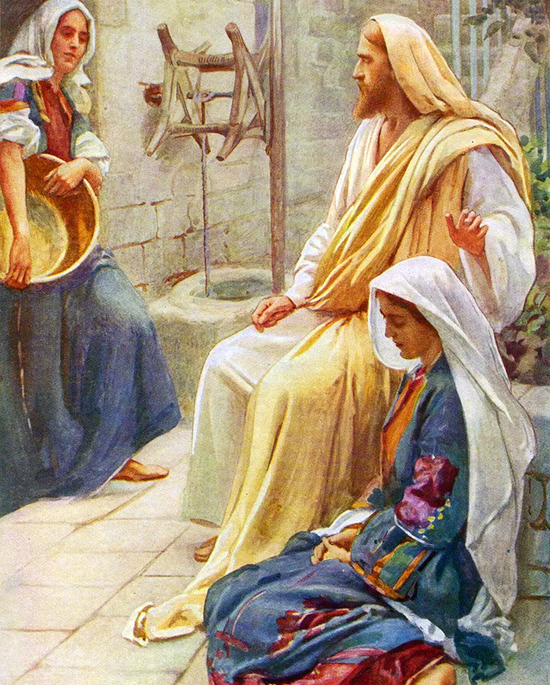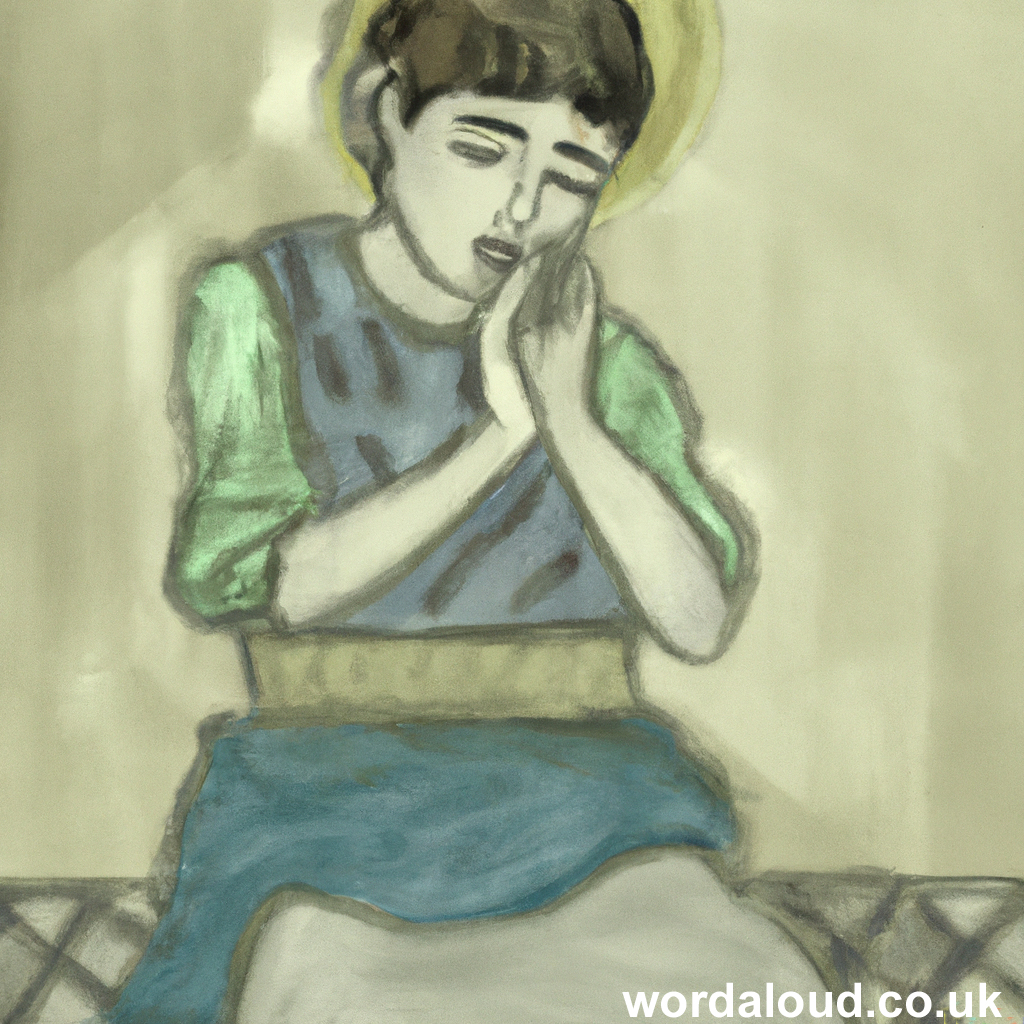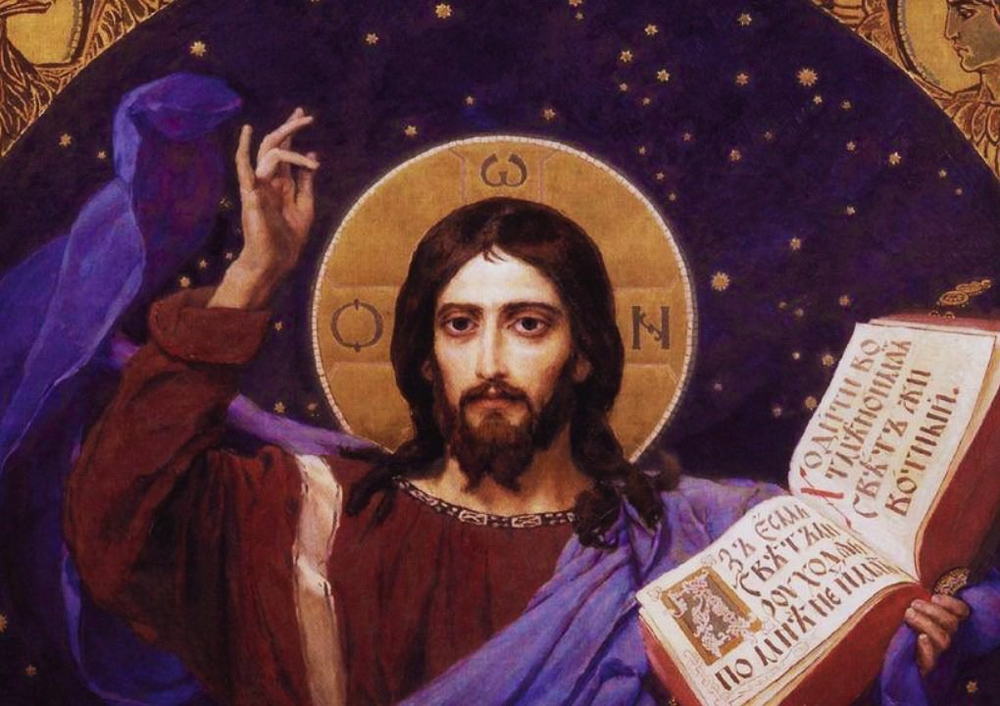Christian Art | Easter To Pentecost
John 14: 27-31 | King James Audio Bible | Daily Verses
27 Peace I leave with you, my peace I give unto you: not as the world giveth, give I unto you. Let not your heart be troubled, neither let it be afraid.
28 Ye have heard how I said unto you, I go away, and come again unto you. If ye loved me, ye would rejoice, because I said, I go unto the Father: for my Father is greater than I.
29 And now I have told you before it come to pass, that, when it is come to pass, ye might believe.
30 Hereafter I will not talk much with you: for the prince of this world cometh, and hath nothing in me.
31 But that the world may know that I love the Father; and as the Father gave me commandment, even so I do. Arise, let us go hence.
In these Bible verses, Jesus begins his farewell to his disciples, and the chapter closes with the words: ‘Rise, let us go hence.’ The natural continuation would then be the verse which opens chapter 18: ‘When Jesus had spoken these words, he went forth with his disciples over the brook Cedron, where was a garden, into the which he entered, and his disciples.’ However, Jesus continues to teach his disciples through chapters 15 to 17. We are aware, then, of the rearrangements which seem to have taken place as John composed his Gospel. The following chapters build on the themes of farewell, of the glory to come, and of Jesus’ relationship with his Father, as John hands on to us more of Jesus’ teaching, so that we may understand more fully. Perhaps, through the preceding words, ‘Arise, let us go hence,’ we may feel ourselves more inclined to hear these teachings of Jesus in the context of his imminent departure, and with the sweet sorrow this entails.
The gift of peace, bequeathed to the disciples by Jesus, is of a quality distinct from civic peace, the peace of the world. Under Roman rule, the Pax Romana was enforced, often brutally, by an occupying power, and came with entrenched, institutionalized inequalities, between, for example, Roman citizens and the occupied Jews, and too between freemen and slaves.
The peace given to us by Jesus completely transcends the peace of the world. It is founded on justice and equality of worth, the human dignity of each and every one of us. It is our reconciliation with God and with our fellow man. It is serenity of mind, in faith, in hope, in love, in charity. It is a gift of God, a fruit of the Holy Spirit. This is the peace which we offer to each other as we celebrate the Eucharist.
While he has been on earth, Christ’s divine glory has been hidden behind his human nature. It is when, through his crucifixion, Jesus returns to his Father that he will be glorified, and in doing so will open the way to our eternal glory. For this reason, the disciples should rejoice at Jesus’ parting, however they are saddened, aware primarily of the physical separation that is to come. They have yet to learn that the gift of peace is to be completed through the parting of Jesus to go to be with his Father, and the descent of the Holy Spirit at Pentecost.
‘For just as the vine-stock supplies and distributes the virtue of its own inherent natural quality to the shoots, so too the only begotten Word of God implants in his people a sort of affinity with his own nature and that of the Father. By the gift of the Spirit they are united with him by faith and every kind of holiness. He nourishes them so that they become devout, and he moves them to knowledge of all virtue and good works.’ St Cyril of Alexandria
King James Audio Bible | Endnotes
The Peace Of Christ And The Prince Of This World
Jesus speaks to his disciples and Jesus tells them that he will leave them with a gift, the gift of his peace. Jesus explains that the peace he gives is not the same as the world’s peace, which is often fleeting and dependent on external circumstances. Instead, the peace that Jesus gives is a deep, abiding peace that comes from knowing and trusting in him.
Jesus tells his disciples that he will send the Holy Spirit to guide them and testify on his behalf. He also warns them that they will face persecution from the world because of their belief in him. He tells them that this persecution is not unique to them but is a result of the world’s hatred of him.
Catholic and Protestant theologians have reflected on the peace of Christ and the prince of this world. Saint Augustine believed that the peace of Christ is not something that can be found in the world but is a gift that comes from a deep relationship with God. Saint Augustine wrote: ‘Thou hast made us for thyself, O Lord, and our heart is restless until it finds its rest in thee.’
Protestant theologian Martin Luther spoke of the peace of Christ as something that transcends the world. He wrote: ‘The peace of Christ is the only true peace. It is a peace that the world cannot give. It comes from knowing that our sins are forgiven and that we are reconciled to God.’
Despite the peace that comes from a relationship with Christ, Christians have faced persecution throughout history. This persecution is often the result of the world’s rejection of Christ and his message. In his book, The Cost Of Discipleship, theologian Dietrich Bonhoeffer writes about the cost of following Christ in a world that is hostile to his message. He says: ‘When Christ calls a man, he bids him come and die.’ Bonhoeffer himself was martyred for his faith during World War II.
Pope Francis has spoken often about the importance of peace, both within the Church and in the world. He has called on Christians to be peacemakers and to work towards a world that is free from violence and conflict. Protestant leaders, such as Rev. Billy Graham, have also emphasized the importance of peace in a world that is often marked by violence and division.
Followers Of Jesus Christ And The Prince Of This World
Jesus speaks of the prince of this world, referring to the Devil. He warns his disciples that the Devil is coming but has no power over him. In John 16:11, Jesus refers to the Devil as the prince of this world, saying that the Spirit will convict the world and the prince of this world will be judged.
Catholic and Protestant theologians have reflected on the influence of the Devil on the world and its people. They have recognized that the Devil offers false promises of peace, prosperity, and happiness, but in reality, his ultimate goal is to separate people from God and lead humanity towards sin and destruction. Put simply: the Devil wants to kill us.
Saint Thomas Aquinas wrote extensively on the Devil’s influence on the world. He believed that the Devil works to deceive people into thinking that worldly pleasures and material possessions are the key to happiness, when in reality they lead to emptiness and separation from God. Aquinas wrote: ‘The Devil does not tempt us with evils that appear to be evils, but under the appearance of good.’
Protestant theologian John Calvin recognized the danger of the Devil’s false promises. He wrote: ‘The world promises peace, but it is a false peace. It promises happiness, but it is a false happiness. It promises life, but it is a false life. These are the tricks of the Devil, who seeks to lead us astray.’
Despite the Devil’s influence on the world, Christians believe that the peace of Christ is stronger and more powerful. They recognize that the only true source of peace and happiness is found in a deep relationship with God. The Devil may offer false promises and temporary pleasures, but in the end, they lead only to destruction.
Pope Francis has spoken often about the danger of materialism and selfishness and has called on Christians to reject these false promises and work towards a world that is focused on the common good.
Billy Graham warned about the dangers of worldly pleasures and called on Christians to seek true happiness and fulfillment in a relationship with God.
It would be folly as Christians to ignore the reality of the Devil. He is pure evil – malice – and he seeks to kill us. Temptation comes from Satan – the Devil – and it is intended to lead us away from God. The Devil is a liar and his lies are so close to seeming truth. We must listen to the Gospel.








